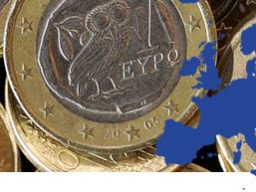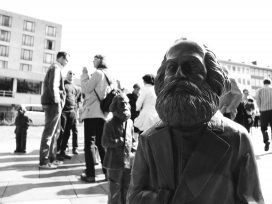A verse of the Koran says: “Oh ye who believe, do not eat up your property among yourselves in vanities” (An-nisa, 4, 29). This is one of many verses and hadiths interpreted as forbidding interest, insurance and the trade in debts. The Prophet was appalled by the sale and purchase of unreal things, and especially when people seek to forestall the will of God, by selling something that they do not possess or which they may never be called upon to provide. Traditional Islamic law therefore forbids many of the commercial constructs that we take for granted: for example, limited liability, which permits people to escape from the consequences of what they do by wearing a corporate mask. Of course, an economy without interest, insurance, limited liability or the trade in debts would be a very different thing from the world economy today. It would be slow-moving, restricted, and comparatively impoverished. But that’s not the point: the economy proposed by the Prophet was not justified on economic grounds, but on moral grounds, as an economy of righteous conduct.
The desire for a moral economy is by no means confined to Islam. In the post-war world in which I was raised economic life was equally circumscribed by moral edicts. For a long time following the Second World War, something called “capitalism” was regarded with great suspicion by European elites, and also by large sections of the people. Capitalism meant “greed”, “profiteering” and “exploitation”. Private business was regarded as an assault on public assets, if not on public morals, and in the England of nationalised industries and massive state projects, it was rare to find the “profit motive” referred to except as an object of abhorrence. When, during the 1970s, I read for the Bar, I was astonished to discover that the English law of Corporations still required companies to make a profit. How was it that, after years of Labour government, such a law had not been repealed, and corporations required, instead, to work for the common good or, failing that, to reshape themselves as cooperatives, and wait to be taken over by the state?
Then came the Thatcherite revolution. We lived through what was, in retrospect, a radical transformation in the world of ideas and also in day-to-day politics. Quite suddenly the system that had been condemned as capitalism was being praised as “the market”. Economics, we were told, was not about profit and exploitation but about freedom. The market was not just a social necessity but a moral good. It was the system whereby each person dealt openly and honestly with every other, to the benefit of everyone. It offered freedom, and demanded responsibility as the price. The state was no longer the guardian of the common good but the great intruder, the free rider on all our contracts, the robber who took the proceeds of honest workers and spread them around its pampered clients.
After the dreary years of socialist Puritanism, this new morality was undeniably liberating. But it liberated both good things and bad, and never faced up to the truth that had dawned on Muhammad – the truth that, in an economy of fictions, nobody can be called to account. Whether bubbles of the kind we have recently seen are a necessary part of the trade in unreal estate I do not know. I suspect that they are, and that the search for regulations that would prevent them is a futile use of public funds and political energy. Nobody can enjoy the sight of people becoming stinking rich by trashing the scant savings of others.
But matters are not usually improved when the state steps in. The underlying premise of state interference is that the state and its clients come first. The main concern of the political class is to ensure that those on whom it immediately depends for an easy life – the bureaucrats and the clients – will be properly provided for, with a reserve fund to buy favour from the discontented. The trade in unreal estate goes on.
The European norm, in which the largest part of the economy is controlled by the state, represents a kind of default position of modern democracies, and one to which the USA, long the exception in Western politics, is now tending. High taxes on all who work hard, take risks and keep the economy going, combined with a free ride for all those from whom votes can be most easily purchased – such is the tendency of the democratic state. Nobody in Greece or Portugal has ever doubted it, and only a residual glimmer of the Protestant Ethic has distracted the Germans from the truth that they are not really entitled to complain, when the Greek political class tries to transfer the cost of its borrowing, which it cannot pay, to the German taxpayer, who can. For that is what social democracy means, and social democracy has been Germany’s greatest post-war export.
Many economists write learned and technical articles to explain how the current debt crisis arose, and how it might be managed. The theory of re-financing and sovereign debt fills many a volume of innocent-seeming graphs and statistics. But this should not blind us to the truth that dawned on the Prophet, which is that we have another and truer way of perceiving these matters, which is the way of moral judgement. If you borrow money you are obliged to repay it. And you should repay it by earning the sum required, and not by borrowing again, and then again, and then again. For some reason, when it comes to the state and its clients, those elementary moral truths are forgotten.
Keynes’ contribution to economics in his General Theory of Employment, Interest and Money was to show that under some exceptional circumstances, we can get ourselves into a stable but bad configuration – a sort of economic coma – in which households would spend more if they had work; and companies would employ more if households spent more; but in which neither dares move first. In such cases, the state can indeed, by borrowing from future generations, become a deus ex machina “spender of last resort”. Who knows, maybe we are in such an extreme situation today.
But if we are, it is because the elementary moral truths of debt and obligation were forgotten and ignored so thoroughly during the last 10 years. Bernard Madoff set up a fund which borrowed from one person to service the debt to another, and so on ad infinitum. As a result he was sent to prison for life. When states do the same they describe their actions as “responsible”, “compassionate”, gestures of “social inclusion”, since the residue of the money borrowed, when the villas, yachts and lovers have been paid for, is spent on pensions, on lowering the retirement age, on unemployment benefits, in other words on reducing productivity to the point where the debt can never be repaid.
If a private person behaves in this way we expect him to be punished by bankruptcy. To escape this punishment by borrowing again is merely to augment the crime. But when businesses and banks judged by the state to be “too big to fail” do likewise they have to be “rescued”, in other words nationalised. This is good news for those who have been wearing the corporate mask, since they can continue to transfer the costs of their behaviour. Thus last year the CEO of Chrysler, a fiction now maintained by the state, rewarded himself with a salary of $8 million dollars for his work in the world of dreams. Only in this way could he show that he, too, was “too big to fail”. And the same goes for states. “Defaulting on a sovereign debt” is supposed to be inconceivable, just as it is inconceivable that the dead industries of Detroit or the profligate banks should be buried.
You may say that there is a disconnect here, between economic and moral wisdom. But I am not convinced by that. It seems to me that the moral sense emerged in human beings precisely because it has proved to be, in the long run, for their advantage. It is the thing that puts a brake on reckless behaviour, which returns the cost of mistakes to the one who makes them, and which expels cheating from the fold. It hurts to be punished, and states that act wrongly naturally try to avoid the punishment. And since they can pass on their hurt so easily to the rest of us, we turn a blind eye to their behaviour. But I cannot help thinking that the result is at best only a short term economic advantage, and that the long term costs will be all the greater. For what we are seeing, in both Europe and America, is a demoralisation of the economic life. Debts are no longer regarded as obligations to be met, but as assets to be traded. And the cost of them is being passed to future generations, in other words to our children, to whom we owe protection and who will rightly despise us for stealing what is theirs.







